Toronto-based artist Victoria Cheong recently released her debut full-length album Real Time via New York based post-punk artist Chandra‘s new label imprint, We Are Time, and basically: it’s arty as f*ck!
Following stints singing backup with the likes of the aforementioned Chandra, as well as Canada’s beloved folk-rock-poet Jennifer Castle (read our Q&A with Jennifer here), Cheong’s solo work perhaps leans more closely towards her roots as a DJ and collaborations with the likes of reggae legend Willi Williams. Under the moniker of her solo experimental electronic pop project, New Chance finds Cheong delving deeper into her own cosmic offerings.
While not not built for the dancefloor, Real Time veers inwards and outwards, resulting in songs that are as intimate and meditative and as they are esoteric and metaphysical. On the album, Cheong explores both the astral and physical experience in relation to the construct and concept of “time” itself.
Described in her bio as “techno meditations,” her song forms manifest in contradictions: as planetary structures such as valleys and gardens, then veering off into full-on astral expanses. Through her uniquely hypnotic, inquisitive tonal perspective, Cheong lyrically navigates simultaneously through states of introversion, and the quest for universal connection.
Thematically, the songs come in search of internal harmony, but also attempt to harness the power of vulnerability, and the courage to open oneself up to chaos.
Deeply rooted in the artist’s study of astrology, the album grapples with the concepts of artistic and physical agency, and harnessing one’s inner spectral universe. Despite these rather hefty conceptual investigations, the Real Time exists in a seemingly weightless musical realm, and remains a captivating, contained universe throughout.
We sat down with New Chance and attempted to tangle out some of the themes on the album, as well what it’s like to operate as a multi-disciplinary artist in an increasingly demanding capitalistic world.
Read the full Q&A after the jump!
�
Your practice is somewhat experimental — do you differentiate yourself as being an artist versus a musician first?
Yeah, I mean, it’s funny. I think of myself more as an artist than as a musician, for sure. I always think of “musicians” as like, technically trained or as having “an instrument” that they specialize in, but it’s weird when you’re an electronic producer. It’s easier for me somehow to just identify as an artist.
In terms of your history as a DJ and live performer, you orbited and almost emerged from Toronto’s DIY arts community, which really nurtured the cross-pollination between visual and performance artists and musicians. Does that lend to your resulting work as a musician and an artist?
Yeah, I think it did in the way that having a community made up of this mix of artists and also the way that encourages collaboration with people practicing different art forms and trying different things, for sure.
Right off the bat, the album starts with addressing this idea of home and “belonging” — have you always been an art weirdo or when did you embrace that and let it manifest in creating various forms of art?
Well, since when I was pretty young I felt like an outsider, and I still feel that way. Even as I get older, I feel still more alienated, but then at the same time I have more confidence, so it’s a weird mix. I don’t want to fit into normative culture at all.
It feels like a part of my fundamental values to be inclusive of a range of ideologies, and to kind of explore or be open to the things that are on the fringe.
The new album seems to be asking a lot of almost philosophical questions about time, and being alive in a voice that feels like you’re writing from a sort of omnipotent perspective and looking around at this strange object, which is the universe. Is that abstraction what separates artists from musicians?
Well, for me it’s definitely an exploration and a curiosity and wherever it goes, it goes. So right now it’s in these musical forms that come together on the record.
In terms of my work as an artist, I think there’s a lot of excavation involved, and then there’s also a need to attempt to express or translate ideas that are kind of complex.
You’re grappling with these existential topics, but in a seemingly abstracted voice. Is this an emotionally personal record for you?
I think of the record as containing so much emotional content for me, but it’s interesting that it comes out in this kind of more abstracted way. It’s kind of non-binary, you know what I mean?
There’s all this in-between experience of life that isn’t just like, “I’m happy because I’m in love,” or “I’m sad because I got dumped.” There’s so much happening in between those big things that I find more interesting to explore.
Has your interest in astrological studies affected the way this album came together, in terms of themes in your work?
You know, 2020 was a pretty magical, messed up year. A lot of people see it as being exclusively bad or messed up, but I think it’s pretty magical when forces beyond you just totally take the reins. It’s refreshing sometimes to not be in control in that way sometimes, as long as you are safe and healthy, which I was lucky to be.
I did have a growing interest in astrology and basically had some major transits happening to my natal chart largely involving Saturn! Saturn is like father time, and represents “the limit” or “the boundary.” It’s a very malefic planet.
Being locked down was a pretty saturnine thing. Saturn is also about navigating those challenges and taking responsibility for your actions. While making the album I had a big Saturn transit and I was getting into astrology and I was kind of connecting with the idea of the “father” — father time and also, the patrilineage of my own family with my father and my grandfather, which was interesting because I’ve always been more focused on the “mother energy.”
The title track “Real Time” marks a less esoteric moment on the record, where you address the idea of forgiveness. Can you talk about that manifestation of a very universal theme of forgiveness and what its role is in that song?
I mean the forgiveness thing is something people really notice and I find it so interesting because it’s just kind of this one line in one song, but it really resonates with people because I think forgiveness is so hard. It’s actually so challenging.
It was just based on this idea that when I was going through things in my life and for me personally I had to go through every other possible reaction and way of being before finally basically submitting to forgiveness.
Forgiveness is scary!
It really is a kind of a submission. You have to really surrender, you know? I’ve been realizing more and more about the idea of surrender, and why it’s such an important part of life and in all these different ways.
Both your previous EP, Hardly Working, and this record seem to explore limitations and tethers to the physical body, and the many ways existing physically is challenged or controlled by the greater confines of the structure of time. How did that become the focus of these songs as a continuation of the last record?
I’ve always been interested in time, and astrology is basically studying the idea of what we understand to be time because you’re looking at planetary cycles and all of our sort of notions of what a day is, what a month is, what a year is. I mean, those things are just about the sun and the moon and how they move in relation to the earth.
In astrology, you end up being able to look backwards and forwards in time through this lens to ask like, “Okay, what are these omens? What are these omens suggesting in the future?”
I feel your music is by artists for artists. On your Hardly Working EP you addressed the idea of the value of artists work and time as an artist almost to the point of parody. How do you find balance in trying to create truthful artwork through practice and monetizing that work so that it has value in capitalistic terms?
I love to work, so I actually am kind of always working, but I’m not necessarily producing and I’m not necessarily driving capitalism with the work that I perceive myself to be doing. Obviously, as artists, we’re so deeply undervalued and underpaid. Being an artist is basically a labor of love and also a struggle for survival for many of us.
It’s just totally confounding to me because I think that art is so important! I just don’t believe that it’s frivolous. I think that’s very capitalist and patriarchal to think that way.
Beauty is a natural thing. It’s a part of this system of life that is as needed as other parts. I feel like our culture is really imbalanced in that perspective.
In a press release, your songs were described as “techno meditations.” Where the last record seemed to be centered around a more dance floor oriented structure, Real Time allows itself to go further out spatially. Even with tracks like “Break My Waves,” which sets itself up to be booty banger, the vocals veer into counterintuitive territory. Can you talk about that tonal shift on this record?
Well as an EP, there’s not room to go that deep. You can’t be that complex within four songs. With Hardly Working,I wanted to do something kind of cheeky and fun, although I’m pretty sure there’s still stuff on that record that are leaning into the realm of these spoken meditative realms. I don’t listen to a lot of current pop or mainstream club music, so when I say I’m referencing pop it’s actually from the eighties and nineties, even in terms of lyrical approach.
I feel like when I listen to current pop music, there’s just such an elevation around talking about getting wasted, or objectifying each other. It’s just so blatant in a way that doesn’t turn me on at all. It’s like, I just hear it.
It doesn’t have to be completely obtuse for me to be interested, but it feels pop has reached this extreme where there’s nowhere left to go.
On the single “Two Pictures,” it feels as though you’re communicating from deep within the dream state, almost from within a hypnosis while contemplating your physical form from this other place…
Right! You’re in it. You’re in the Matrix. My favourite thing about music is that you can be in such an immersive state. It can literally alter your spatial state. For me it’s my number one drug. When I make a song I am working on feeling my way towards an altered state of some kind and, and a lot of the time that’s like a whole fleshed out world.
A lot of the time it’s kind of like a dark world with some shimmering glimmering stuff in it, but it’s there physically, in terms of texture and light. I think it’s a healing space. It’s healing to go into an altered state and then return from it changed.
Speaking of altered states, you made the video for “Two Pictures” while at home in lockdown. Its very minimal but extremely captivating. Can you talk about how that song manifested in that image?
It was around Halloween and I wanted to do something to honor the Scorpio season. I was just feeling that energy, like I could channel it and do something around it.
I was actually inspired by some of the tarot ladies on YouTube, who are just so performative and out there. So I set it up and I knew that it needed to be about the performance. I knew that the performance was going to be the thing that would carry it.
Because the action in the video is minimal, the smallest gestures take on a huge roll. Were the movements intentional through choreography or was it more of an improvised performance?
I’d say it was improvized into intentionality, you know what I mean? I workshopped it a little bit for sure. I was like, “Okay, I’ve got these elements. I’ve got this really beautiful, mesmerizing curtain to work with, and I’ve got a fan on a switch and I’ve got this analog star filter.” The analog star filter? You just can’t go wrong with it!
Can you talk about the artwork for the album and how it became emblematic to the record’s theme?
The artwork came from my grandfather’s scrapbooks. He had these bonzai scrapbooks, and I’ve always been into them. It’s like a window into seeing through someone else’s eyes. It’s so nice. He’s long passed away and I didn’t really know him, so it’s a nice way to know somebody.
The cover image of the record are photos of his night-blooming cactus that my father has stories about from when he was growing up. My grandfather would stay up all night to photograph it, because this plant only blooms once a year.
I’ve heard, since then, that it’s caused to open by the light of the full moon. I just thought that it was a perfect representation of the cyclical nature of life and wanting to include that as a theme on the album.
The theme of the record is encapsulated in the cover art and in the title as well. What is “real time”? Real time includes everything, real time is minutia, and a lot of death and birth and death and birth over and over again.
Is real time in opposition to father time?
I think Father Time is this form, this almost paternalistic godlike figure.
He’s basically a cop.
He is like a cop! Saturn is like a cop. Saturn’s the gatekeeper, but in a way, time, Saturn is like a representative of time, but time is beyond that. I mean, Plato said that time is the moving image of eternity.
I like to default to that when asked what time is, which people have asked so much that specific question over the pandemic.
So while grappling with all these big far out questions, can this inquisitiveness translate to the dance floor or do you think of the record as meant to be more of an introspective experience? Are the two mutually exclusive?
Hard to say! I didn’t have those kinds of intentions when I was making songs. I didn’t intend to make a dance floor hit. I don’t ever approach things that way.
There is a lot of like older, original house music that has this contemplative or spoken word element. A lot of early house music had emotional, thought-provoking content. I like erring on that side of things.
That’s been a big inspiration for me in terms of telling a story in a certain way, but still have it over a beat that can work on the dance floor. You can seduce people with the dance floor rhythms, and then they can also kind of have their brain tickled a little bit.
I think on a fundamental level that I’m interested in the in-between experiences. I’m interested in things that are kind of both and neither. I consider myself to be like an embodiment of that, in the world, even as a racially mixed person. I’m both and I’m neither, and that’s really true.
It provides a framework for exploration. For instance: what is love? Love is complicated and also so simple. It’s so nuanced and multifaceted, it’s not one thing because it’s so deep.
You learn what love is by loving, just like you learn what life is by living.
— Q&A by Kevin Hegge (@theekevinhegge)
Real Time is available now on all streaming services, or buy the physical copy via We Are Time.

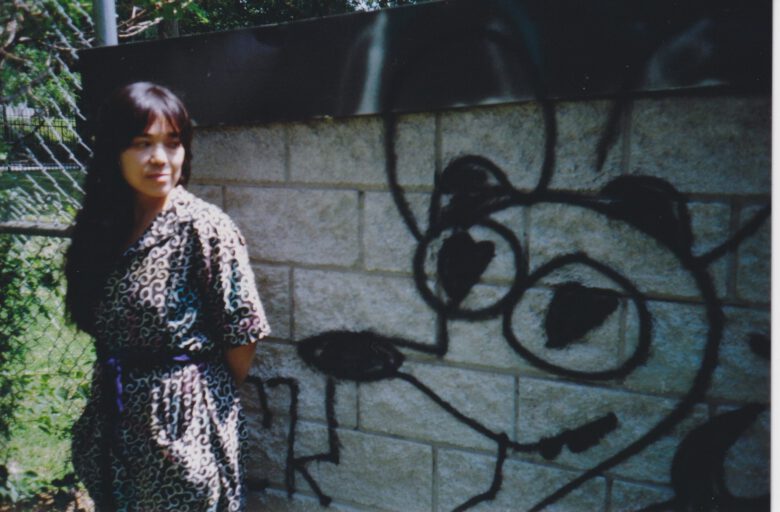
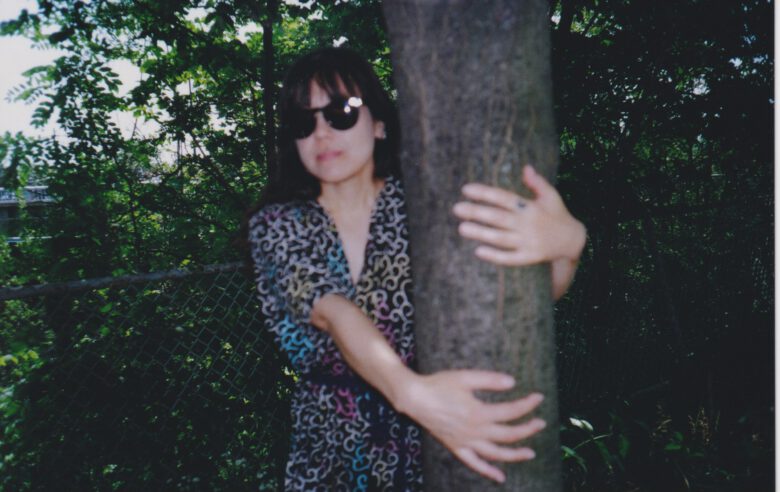
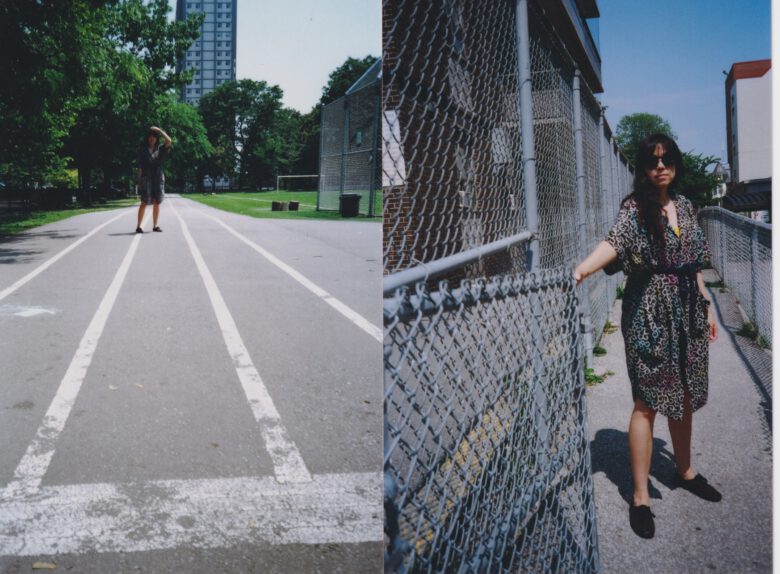
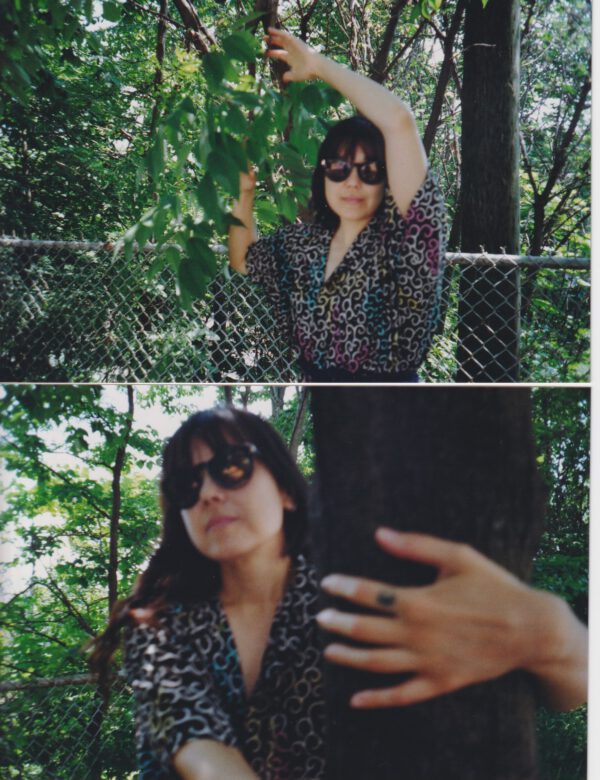
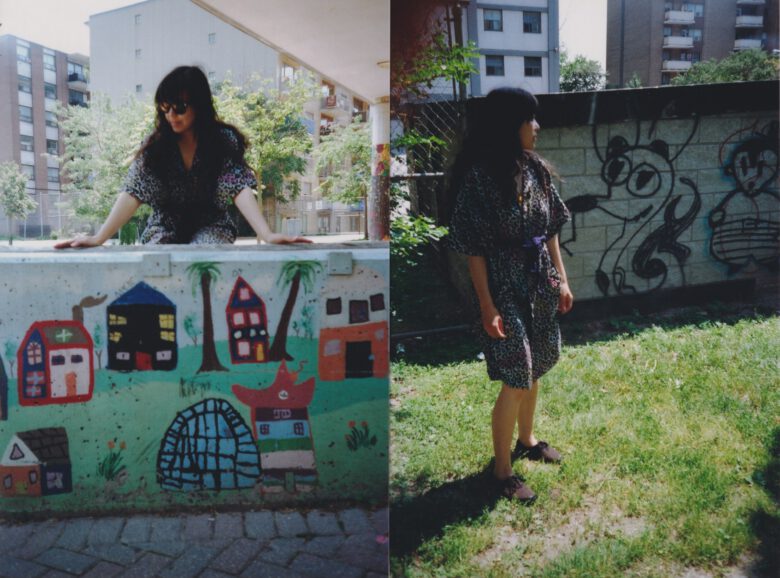
Be the first to comment on "OMG, a Q&A with New Chance"